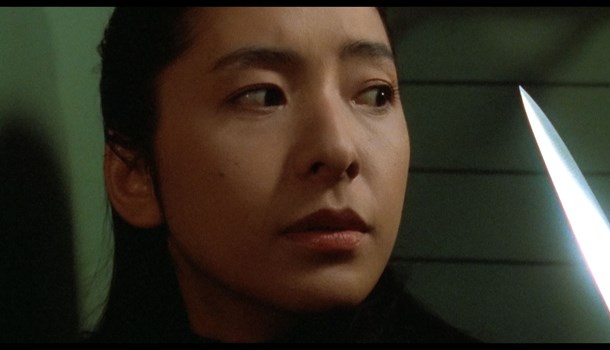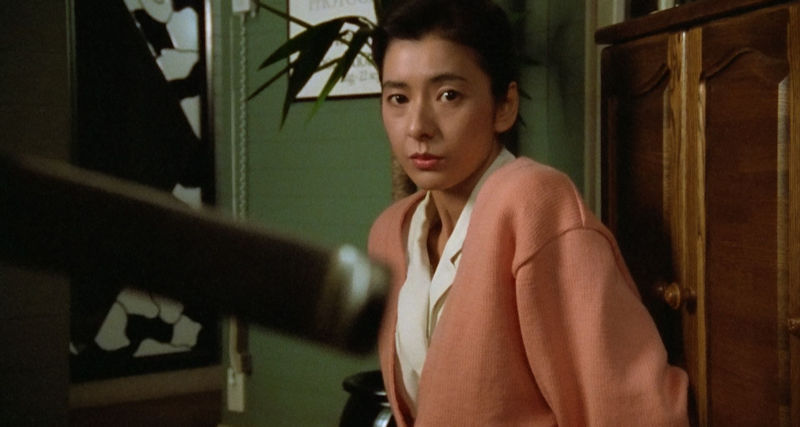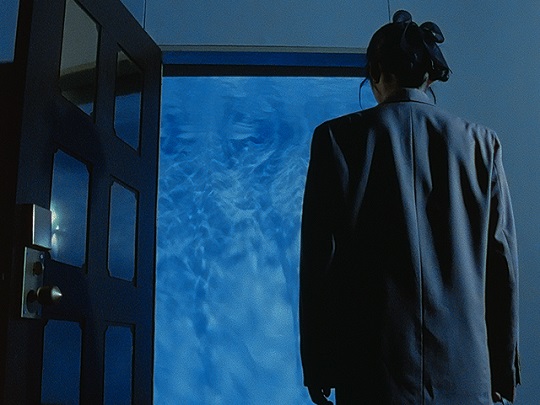
Written by Richard Durrance on 27 Dec 2023
Distributor Third Window • Certificate 18 • Price £17.99
Yes, it took me far, far too long to finally watch Door (1988), but I get there in the end, I always do even if suffering crushing guilt for not having done so earlier – OK, mild guilt but allow me some poetic license here. But, of course, this Third Window Directors Company release is not just a single film by director Banmei Takahashi but also Door 2: Tokyo Diary (1991).
Two very different films, Door is a proto-horror-slasher-drama-with-a-dash-of-satire that sees housewife Yasuko (Keiko Takahashi) continuously assailed by cold calls, salesmen at the door and even someone locally who returns her rubbish when she accidentally leaves it out on the wrong day. It all becomes too much when salesman, Yamakawa (Daijiro Tsutsumi), tries to thrust paperwork through her door not her letterbox and she slams it shut on his hand. Suddenly, Yasuko is under siege from Yamakawa’s observations, phonecalls, threats and attempts to enter through the front door.
A pink movie, Door 2: Tokyo Diary follows young, independent call girl Ai, (Chikako Aoyama), as she explores the sexual mores of Tokyo, perhaps finds herself in love with a client who is a collector of fake art, Mamiya (Joe Yamanaka); meanwhile her gainfully employed childhood friend is on the verge of marriage.
By all accounts the second film used the title Door 2 because it meant gaining a larger budget even if it has nothing to do with the original film, though to be honest the screenplay does a good job of meaningfully incorporating the “door” of the title into the film, as Ai (ironically translating as love and yes it is her actual name) describes each time she opens the door to a client as a mystery where she will not know what will be facing her.
So,back to Door; like the first Directors Company film Third Window released (The Guard from Underground), Door is very much a proto-slasher, but like The Guard from Underground it’s more interesting than that. The film gives itself plenty of time to work up a head of steam and has some nice 1980's social observation, most of this seen from the perspective of Yasuko’s life as a housewife. The near continuous unwanted interruptions from those trying to sell or get something from her is clearly more than a usual irritant. The film too builds the sense of her being an outsider, an interloper and this is really beautifully constructed; there’s a delicate sense of unease that surrounds her that is separate from the most obvious things, like how her husband is often away working for days at a time. Also, how these interruptions often come from classic 1980s money-spinner idiots gives the film a nice satirical bite at the outset. Takahashi handles the film well visually, especially considering that much of what happens takes place within just the family apartment or in the immediate vicinity. This is something that continues throughout, Takahashi really provides a lovely visual edge even when sometimes the film fails to work narratively.
At first Yamakawa as the apparently vindictive salesman makes sense: he’s an 80s go-getter and Yasuko has injured his hand. He cannot work (or so he says) but moreover the sense of roiling frustration in him suddenly going from simmer to mental breakdown that focusses on Yasuko makes his continuous phone calls to her, up to the moment when he repeatedly kicks her metal front door, so very meaningful. Yet as he moves to more overt threats, including against her young son, I found my suspension of disbelief straining and struggling, because there comes a point where Yasuko has proof of who he is and the threats that he has made that logically should be presented to the police (and at this point in the film she has seen the police who are sympathetic), so at about the hour mark of the 95-minute film I found my eyes-rolling because though Takahashi is able to keep the film interesting visually, the story seems underbaked, not quickly enough told for us to forgive some plot holes or well-thought-out enough to make sense.
The story works well for the most part, up to point where Yamakawa finds his way to the other side of the door, into the apartment, and Yasuko’s reaction to this threatening intrusion. Admittedly, once the action moves into the apartment Takahashi manages it with aplomb, and there are some terrific moments where the space in the apartment is beautifully used – there's also an extended sequence that could be a homage to The Shining that is slightly ludicrous but fun – but my problem was that by this point my lack of suspension of disbelief caused me problems. If the film had shaved 10-15-minutes from the runtime, the end result would have felt different but because not, the film’s narrative issues hit harder than they could have. It also doesn’t help that Yamakawa’s motivation for what he does dwindles, the eventual outcome undermining the social and satirical elements almost entirely.
That said I thought Keiko Takahashi (wife of the director) as Yasuko was terrific. The rest of the cast are all fine, but she embodied the frustration, anger, distress and resolve so well that she carries the film when it fails narratively. Keiko Takahashi has such a tremendous presence in the film that you can believe it when she stands up to her attacker as she feels the stronger of the two, mentally if not always physically.
Still, Door is visually exciting, the overhead sequence later on in the film is an absolute corker, it has a cracking (if straightforward) soundtrack, but it also comes with some very specific issues I found it hard to entirely forgive.

Door 2: Tokyo Diary learns one key lesson from Door, it keeps the film to 82-minutes and the film benefits from this lean run time. As I mentioned it’s a very different film, in part similar to the Tokyo Decadence released the year after and perhaps in part influenced aspects of Shinya Tsukamoto’s A Snake of June (and how I love that film) though without Tsukamoto’s particular cinematic talent. The twenty-something call girl, Ai, is the centre of the film and it’s very much a picaresque narrative. There are strands of the story that link Ai to others: her school friends who are getting married, and to Mamiya the art collector, but often the films really seems to be a way to explore the more disturbing aspects of society as well as Ai’s character. Ai is very arguably a disturbed woman, though she is unable to see this. A call girl that uses a message service to connect her to (sometimes not so) gentlemen, much of the film follows a series of her encounters, which may require her to do no more than remove her shoes in public or have much more disturbing and dangerous consequences.
How Ai relates to her friends is telling, especially at the end of the film; also to Mamiya, who has a bit of a thing for S&M, but Ai never recognises who she is, what is motivating her to walk through each door and explore life – even if as a call girl. At one point Ai's friend describes her as being "strong" and I suspect we are meant to question this, because in a way Ai seems to have surrendered herself to her life and though she makes choices, it is at a surface level. Some aspects of her 'career' she calmly says she accepts, but when shown these elements we realise that how she processes these in her mind is very different from reality. One encounter specifically is exceptionally well-drawn by Takahashi because it is not exploitative and immediately we recognise the danger that Ai and those she knows who do the same work face. A scene that could be gratuitous is instead as carefully constructed as you could hope to illustrate aspects of violent male sexuality and the impact on Ai and a friend – it's unpleasant in absolutely the correct sense, this is not a scene you should revel in but it is essential to the film and never does more than it needs to.
The film also shows the possible repercussions of this life, so there is nothing rose tinted. Keiko Takahashi has a great cameo as an ex-call girl trying to open Ai’s eyes to the dangers she faces. Arguably Door 2 has no overriding message but works to dissect aspects of what was then modern Japanese life and does so well. If anything, I thought it a better film overall than Door – though I may be alone in this. Door has moments that surpass Door 2 for sure, but Door 2 avoids those moments of disbelief that Door suffers from. Also, there is an oddly approachable performance from Chikako Aoyama as Ai, who is able to embody moments of horror and also an almost dreamlike separation from reality.
Neither Door nor Door 2 are perfect films, both clearly made on a budget and at speed, but each of them should be on your to watch list because those moments that excel really do stand out. Some will like Door more than me and forgive its shortcomings (certainly horror genre fans I think will) more than a difficult bugger than I would; while others I hope will appreciate Door 2 as much as I did because it’s a pink film in the best sense of what we saw previously in Pink Films Vol 1-6. Though there’s some sex, nudity and provocation, the provocation is as much of the mind while and the sex is by the by (and if you really want nudity and sex go elsewhere as there isn’t that much here anyway).
Ai never knows what's on the other side of the door


Long-time anime dilettante and general lover of cinema. Obsessive re-watcher of 'stuff'. Has issues with dubs. Will go off on tangents about other things that no one else cares about but is sadly passionate about. (Also, parentheses come as standard.) Looks curiously like Jo Shishido, hamster cheeks and all.
posted by Richard Durrance on 12 Feb 2026
posted by Richard Durrance on 10 Feb 2026
posted by Richard Durrance on 07 Feb 2026
posted by Richard Durrance on 03 Feb 2026
posted by Richard Durrance on 27 Jan 2026
posted by Richard Durrance on 19 Jan 2026
posted by Richard Durrance on 08 Jan 2026
posted by Richard Durrance on 17 Dec 2025